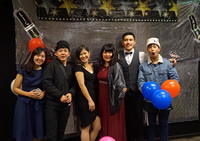2017経営学部海外留学プログラム
Tacomacommunitycollege 私の異文化体験
渡辺 麗香

| 経営学部海外留学プログラムとは | 留学先大学 | 先輩からのメッセージ |
| 異文化体験報告書 | もっと知りたい留学生活! | 経営学部海外留学プログラム Facebook公式ページ |
2017経営学部海外留学プログラム
Tacomacommunitycollege 私の異文化体験
渡辺 麗香

“What’s up?” This is a phrase which made me confused. I had a problem that I had not been able to understand when I came the USA. It was that almost all people asked my health and condition when I met a friend every time. For example, when I rode a bus, the person who is setting on my next said the phrase to me. As that time, I didn’t understand the phrase well, so I couldn’t response to him. I just smiled to him. At then, he got that I couldn’t speak English well. I felt uncomfortable because of being asked by a stranger. This incident made me scared to talk with English speaker. In addition, Japanese people never ask about it even though they are friends, and they do not tell people about bad condition. Japanese people only say it when they are absent from a class and a company, so I always said “Good”. Japanese people feel guilty if they tell about their bad condition. This is because, people who asked me about it may worry my feeling seriously if people answer so. After three months, I am understanding the meanings of the phrases: “what’s up?”, and “how are you?”. These phrases mean only greeting, and I am being able to answer well. I reconfirmed Japanese culture which they feel guilty when they tell about own condition seriously. In addition, it must make people who asked worry. I felt it when I was making a conversation and taking with people from the other counties. For example, while I was cooking a dinner by myself, my Chinese roommate came there, and she started eating the dinner without saying anything to me. I was puzzled and could not understand what happen at that time. Moreover, when I was spending time in my room alone, my roommate came into my room without knocking. After that, she started using my personal effects without permission. These experiences are unusual for Japanese culture, so I had never experienced this kind of feeling. Through these experiences, I learned the difference between Japanese culture and other cultures, and I reconfirmed that it is hard to spend time with people from the other countries. In addition, we had a lot of discussion time in the class. We do not have a lot of participatory class in Japan, so it was new experience for me to discuss every day. It was very difficult to say my opinion in English, but my classmates from other countries proudly said their own opinion in class. Their attitude of telling own opinion without fear was very respectable. At the same time, I had trouble with the questions requiring non-specific answers. Japanese universities require us to find specific answers. Therefore, it was very difficult for me to make an answer with my imagination without a specific answer. Japanese people are often afraid that they will make mistakes because they are in an environment where only specific answers are required. As a result, I thought that Japanese people’s imagination tends to be lacking. I felt from these experiences that people who live in the United States are not as afraid of making mistakes, and they learn a lot from mistakes. Moreover, I thought that the United States is a country which would not forget to act and think by oneself. I had a difficult time with speech and culture, for the first few weeks in the United States. However, I challenged everything without fear. Consequently, I conquered my weak point. I thought this growth was meaningful to have studied in the USA.